Late Friday, Politico ran one of those reports that led me to double-check the date, to make sure it wasn't an old article. The headline said Donald Trump's backers are "pleading" with him to craft a plan to combat the coronavirus pandemic.
Trump’s political allies, alarmed by his sinking poll numbers, are warning that the president’s best chance to get reelected is to outline more detailed plans to conquer the coronavirus he keeps trying to wish away. They are advising him to offer people something concrete they can look to as the pandemic surges in dozens of states, eroding months of progress.
It's a good article that's worth your time, but it was hard not to marvel at the absurdity of the broader circumstances. Six months after the first documented infection on American soil, people close to the White House -- folks who want the president to succeed politically -- have been reduced to reminding Donald Trump that he should probably come up with some kind of plan to deal with the crisis.
The pleas are necessary, of course, because the president, even now, still doesn't have a blueprint for success -- aside from waiting for COVID-19 to "sort of just disappear."
It's not difficult to imagine an alternate reality in which Trump handled the pandemic in a way that benefited everyone -- including himself. Indeed, while this crisis posed (and continues to pose) enormous challenges, it wouldn't have been that difficult for the president to take rather obvious constructive steps.
Indeed, had Trump managed the crisis responsibly, he would've been able to present himself as the hero of the year in advance of his re-election campaign. So why didn't he? Why not listen to the public-health authorities, implement a consistent, evidence-based strategy, and govern effectively?
The Washington Post ran an interesting report on this yesterday.
People close to Trump, many speaking anonymously to share candid discussions and impressions, say the president’s inability to wholly address the crisis is due to his almost pathological unwillingness to admit error; a positive feedback loop of overly rosy assessments and data from advisers and Fox News; and a penchant for magical thinking that prevented him from fully engaging with the pandemic.
The article added that Trump’s shortcomings "have perplexed even some of his most loyal allies," some whom don't understand why the president hasn't "at least pantomimed a sense of command over the crisis."
In other words, Trump isn't just failing to lead; he's also struggling to fake it.
I continue to think the post-policy thesis from my book helps bring fiascoes like these into focus. Governing parties take seriously evidence and data. They put stock in the judgments of subject-matter experts. They believe in turning the gears of government to solve problems.
Trump and his party, however, have arrived at a point at which none of these things matter. As has become clear in recent years, the president does not know how to govern responsibly, and he's indifferent to learning. He's not bothering to "pantomime a sense of command over the crisis," in part because he has no idea what that would look like.
It's why Trump sidelines experts and ignores policy briefings, turning instead to those who tell him what he wants to hear, while clinging to the belief that the crisis will go away on its own -- because the alternative would require him to do real work for which he's wholly unprepared.

